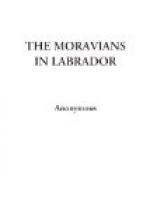By this extraordinary and friendly visit, the brethren remarked, “the celebration of the jubilee of the mission acquired a peculiar and new feature, as we were at the same time assured of the favour of those, whom God has appointed to rule over us, and may hope in future also to experience a continuance of that protection we have hitherto enjoyed. The Lord has also caused his work to be glorified in the sight of men.” But this visit was still further important, as it tended to accelerate the formation of a fourth settlement.
CHAPTER IX.
The Brethren obtain a further grant of land
on the east coast of
Labrador.—projected fourth
settlement delayed.—Progress of the
three settlements in the interval.—Instances
of wonderful
preservation—Ephraim—of
Conrad, Peter, and Titus.—Report of
the Superintendant, Kohlmeister,
on the general state of the
Mission.—Commencement
and progress of Hebron, the fourth
station.
Much as the brethren desired to establish a settlement on the Ungava country, and anxious as the Esquimaux there were, that they should reside among them, providential difficulties, as above alluded to, prevented what appeared so urgent a call from being complied with, and, in a manner, forced upon the brethren’s consideration the propriety of forming a fourth station on the east coast. They had, therefore, applied to the British Government for a further grant of land; and the report of Captain Martin having been so highly favourable, all obstructions were removed, and next year the order which had been granted by the Prince Regent in Council, 13th May 1818, securing to them the possession of the coast from Okkak to the 56th deg N.L., including the bays of Napartok, Kangertluksoak, and Saeglak, was transmitted to Nain through Governor Hamilton, accompanied by a letter written under his own hand, wishing them every success in their Christian undertaking. From the great increase of the population at Okkak, the attention of the missionaries was principally directed to Kangertluksoak as the fittest place for a new station; as, in the spring, a great many of their own Esquimaux went thither to obtain a livelihood, the distance being about sixty miles yet several years elapsed before they were able to carry their plan into




